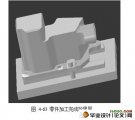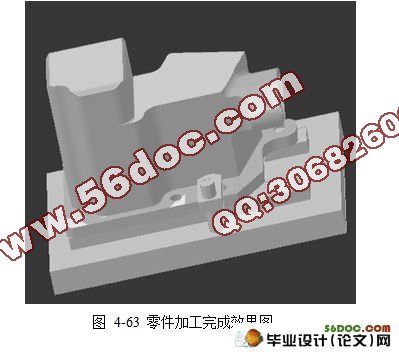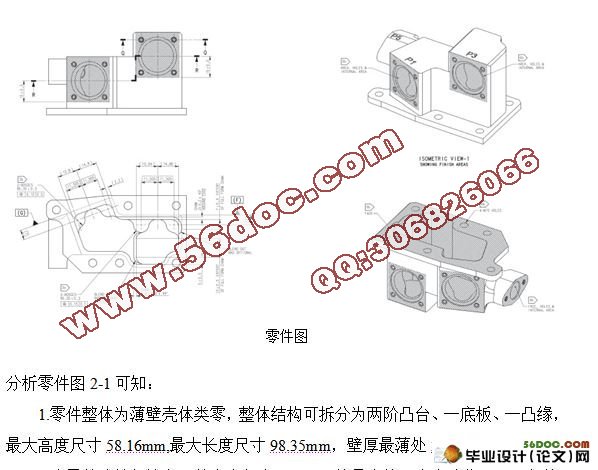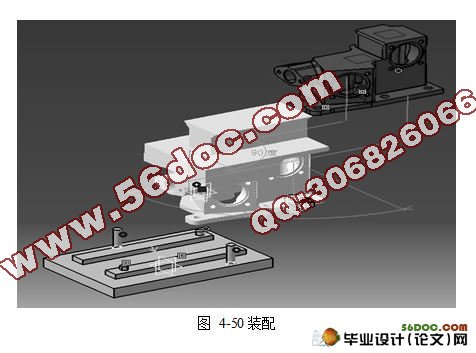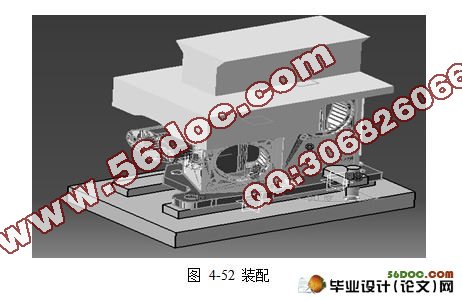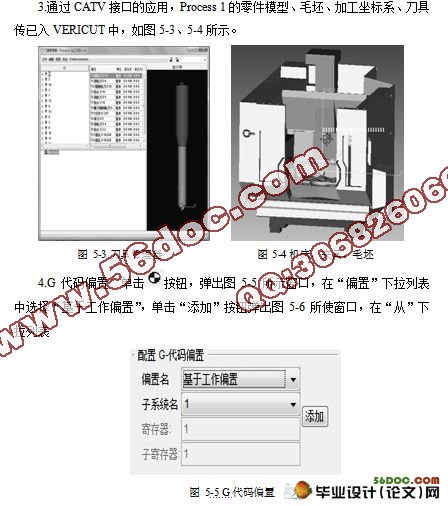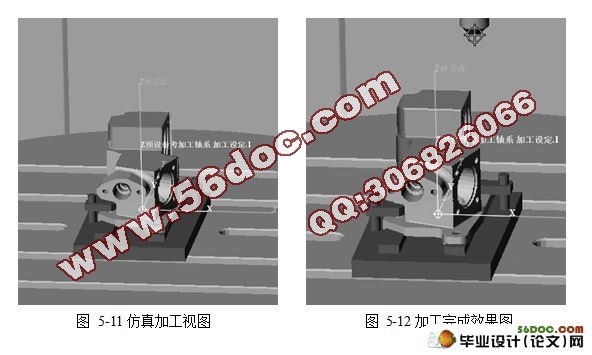飞机操作系统壳体类零件实体加工与仿真(CATIA三维零件)(任务书,设计说明书14000字,cad图纸1张,CATIA三维零件,答辩PPT)
摘 要
CAD/CAM技术的迅猛发展以及软硬件水平的进一步完善,为制造业提供了强有力的技术支持,也为企业的产品设计、制造和生产水平的提升带来了质的飞跃,CAD/CAM技术已经成为现代企业信息化、集成化和网络化的必然选择。
而在现代工业生产中,大部分的产品都需要进行三维造型与实体加工仿真,本文以飞机操作系统壳体类零件为例,应用CATIA软件,结合专业课程理论,进行三维造型与实体加工仿真。首先对该壳体零件结构进行分析,构思实体造型思路,通过CATIA里面的建模模块,应用拉伸,旋转,布尔运算等特征功能对实体进行造型。通过对实体的造型,根据实体结构的分析确定了加工思路,通过CATIA的加工模块,应用设置刀具,选择毛坯,生成刀轨等特征功能对实体进行加工。对壳体零件的三维造型及实体加工仿真进行了深入的探究,对实体加工仿真同时也进行了详细的阐述,并且进行了VERICUT的验证仿真。
通过对飞机操作系统壳体零件的三维造型及实体加工仿真,可以缩短产品开发周期,降低生产成本,提高产品质量和生产效率,激发我国制造业发展的新思路,促进我国制造业的发展。
关键词: CATIA,三维造型,加工仿真,验证仿真
ABSTRACT
The rapid development of CAD/CAM technology and the software and hardware level of further improved, provided strong technical support for the manufacturing industry, also for the enterprise product design, manufacturing and production level of ascension brings a qualitative leap, CAD/CAM technology has become the inevitable choice of modern enterprise information, integration and networking.
In modern industrial production, most of the products need to be 3D modelling and simulation entity processing, based on the shield parts of flight controls as an example, the application of CATIA software, combining the theory of professional courses, 3D modelling and simulation entity processing. First carries on the analysis about the structure of the shield parts of flight controls, thinking entity modelling idea, through the modeling module in CATIA, application of stretching, rotating, characteristic functions such as Boolean operation on entity model. Through to the entity modelling, according to the analysis to determine the processing plan of entity structure, through CATIA processing module, application Settings tool, select blank, characteristic functions such as tool path is generated on the real process. For the shield parts of flight controls 3D model and entity processing simulation conducted in-depth exploration, to the real machining simulation is also carried on the detailed elaboration, and has carried on the simulation validation of VERICUT.
Through to the the shield parts of flight controls 3D modelling and simulation entity processing, can shorten the product development cycle, reduce production cost, improve product quality and production efficiency, and stimulate new train of thought on the development of manufacturing industry in our country, promote the development of manufacturing industry in our country.
KEY WORDS: CATIA, 3D modelling, machining simulation, validation of the simulation
主要技术指标
1、CATIA 三维零件模型一个:
2、实体加工仿真NC程序一个:
3、加工仿真验证结果:
4、设计说明书一份:
分析零件图2-1可知:
1.零件整体为薄壁壳体类零,整体结构可拆分为两阶凸台、一底板、一凸缘,最大高度尺寸58.16mm,最大长度尺寸98.35mm,壁厚最薄处2.2mm。
2.该零件孔特征较多。其中直径为22.5mm的最大的两个大孔位于不平行的两个面上,两个大孔的周围都有呈矩形阵列的四个螺纹盲孔。凸缘的中心是一系列同轴的多级孔,两个螺纹盲孔分布在通孔的两侧。零件底板上六个光孔以一定的尺寸分布在两阶凸台的周围。
3.型腔及外轮廓特征分析 零件型腔轮廓由与底板平面垂直的圆弧曲面与平面构成。除去有特殊设有螺纹盲孔与凸缘的位置,型腔与外轮廓间壁厚均匀。
4.根据该零件的上述特征可采用五轴铣床,分两次装夹完成加工。第一次装夹完成型腔、所有通孔、所有螺纹盲孔、底板下平面及其外轮廓、凸缘的加工,第二次装夹完成零件顶部平面及外形轮廓加工。
2.3 虚拟加工的流程
虚拟数控加工的整个过程是通过计算机来实现的,是虚拟建模技术、数控加工编程技术和数控加工仿真技术的集成。一方面根据提取的零件参数,绘制零件的几何模型,分析零件的加工工艺,选择合适的数控编程模块生成加工刀位数据文件,再经过后置处理自动生成适合特定机床的数控程序;另一方面构建虚拟加工环境,以生成的数控程序或刀位文件为驱动,动态仿真零件加工的整个过程,检查加工中出现的碰撞、干涉等问题,并对加工质量进行评估。
目录
摘 要 I
ABSTRACT II
第一章 绪 论 1
1.1 课题研究的背景和意义 1
1.2 课题研究的主要内容 2
第二章 零件的结构与加工工艺分析 3
2.1几何建模方法综述 3
2.2 加工对象及工艺分析介绍 4
2.3 虚拟加工的流程 4
第三章 基于CATIA的零件三维实体造型 6
3.1 建模软件介绍 6
3.2 建立三维模型 6
第四章 实体加工仿真 16
4.1建立CATIA产品文件Product 1 16
4.2 Process 1零件操作定义 17
4.3 Process1加工操作 18
4.4建立CATIA产品文件Product 2 33
4.5 Proess2零件操作定义 34
4.6 Proess2零件加工操作 36
4.7 程序后置处理 39
第五章 VERICUT的验证仿真 42
5.1 VERICUT简介 42
5.2 CATIA 与VERICUT接口的实现 42
5.3 加工验证过程 43
第六章 总结 48
参考文献 49
致 谢 50
毕业设计小结 51
|
